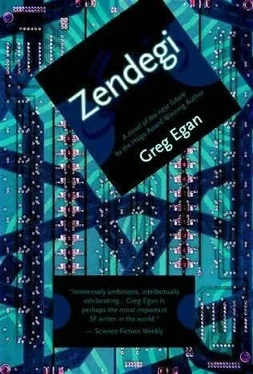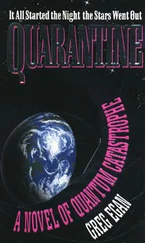Martin squatted down and kissed him. ‘Be good, pesaram. I’ll see you in Zendegi.’
Nasim led Martin to the MRI room. The scanner was far more compact than the older model in the hospital’s radiology department – a machine that Martin had come to know all too well – but Bernard, the Swiss technician who operated Zendegi’s version, had assured Martin that the magnetic field was an order of magnitude stronger. Martin had come in on three mornings the previous week to learn how to control his icon while lying flat on his back with his head immobilised in a padded helmet.
He took out his wallet and removed his watch, his wedding ring, his belt and his shoes. He was wearing clothes that had been pre-checked and certified metal-free to save him from having to change for the scanner, but Bernard ran a detector over him quickly to be sure.
Nasim fitted the skullcap that would be used to take EEG recordings simultaneously with the multi-mode MRI; Martin sat beneath a UV light and watched in a mirror as the semi-permanent tattoos they’d given him revealed themselves with green fluorescence, to aid in the alignment of the cap. In order to limit interactions with the MRI’s magnetic field and radio pulses, the skullcap’s ‘circuitry’ was purely optical, reading the electric field leaking out of his brain by observing its effect on tiny capsules of electrolytes incorporated into the tattoos.
Bernard swabbed Martin’s arm with disinfectant and injected him with a mixture of contrast agents that had been magnetically polarised overnight in a special-purpose machine. You could image brain activity to a certain extent just by watching haemoglobin in the blood losing its oxygen to hungry neurons, and that was one signal they’d be looking for. But there were a dozen other processes that could be monitored simultaneously with modern machines – making the image sharper, more responsive and more informative – and extra chemicals with enhanced magnetic properties were needed to render those processes visible. Bernard had sketched the details, but Martin had had too much else on his mind to take it in. It was sufficient to know that they were pulling out all the stops to gather as much information as possible.
Nasim passed him a pair of gloves and he slipped them on, then she helped him with his goggles; all of this equipment had been specially built for use in and around the scanner. He walked over to the MRI, lay down and wriggled around to try to find a reasonably comfortable position that allowed his head to sit in the custom-moulded restraint.
‘Everything okay?’ Nasim asked.
‘Yes, thanks.’ Martin’s stomach was clenched with anxiety, but he’d already asked all the questions he could think of the week before. Nasim had assured him that there was nothing he could do that would corrupt the side-loading process; even if he thrashed about and spoiled the scan, they’d just discard the bad data. There was no risk of it being used inadvertently and turning the Proxy’s brain to mush.
‘What if I have homicidal thoughts about my son?’ he’d asked after one of the training runs. He’d been half- joking, but it had probably focused Nasim’s attention more effectively than if he’d merely waffled on about his fear of exhibiting impatience or irritability.
‘Does that happen often?’ she’d inquired.
‘No – but have you ever tried not to think of a pink elephant? Under threat of putting your only child in the hands of your evil clone?’
‘Calm down, Dr Jekyll. If you have any prolonged negative thoughts, let us know and we’ll throw out the whole session. But if they’re fleeting, I wouldn’t worry. This machine isn’t capable of churning out a second-by-second transcript of everything that passes through your mind; at best, we’ll be able to discern your most persistent thought patterns and associations and train the Proxy to share them. But we’ll be working hard to get enough information to do that. Brief mental tics will be right off the radar.’
Nasim flipped the goggles’ screens down, whiting out Martin’s vision. The top of the cage she fitted over his head included a camera that would monitor his facial expression, just as it would be monitored in an ordinary ghal’e. He heard the servo motor sliding him into place inside the scanner. He was free to move his hands, but if he tried to raise them above shoulder-height he’d get a swift reminder of his actual circumstances.
‘Are you ready for Zendegi?’ she asked.
Martin said, ‘Yes.’
Vivid blue sky. Yellow mud-brick buildings. Women in richly patterned scarves bustling past. Martin felt a tap on his hand. Javeed asked impatiently, ‘Baba, what’s wrong?’
Martin finally gained control of his gaze and managed to turn his icon’s head towards his son’s voice without struggling against his restraints. ‘Sorry, I was just getting used to my ghal’e.’ He looked around. ‘So this is Old Kabul!’ No time to make an entrance from the city’s outskirts; they’d been inserted straight onto a busy street. A small boy leading a donkey loaded with gourds squeezed past them; he grinned at Javeed and greeted him with ‘Salaam aleikum.’ No doubt the phrase was wildly anachronistic, since they were meant to be in the pre-Islamic era, but Martin wasn’t here to nitpick. They weren’t planning to be too faithful to Ferdowsi, let alone historical fact.
‘We need to get to Zal!’ Javeed reminded him.
‘Yeah – so what’s your plan?’
‘They don’t know that the man in the prison is Zal,’ Javeed reasoned, ‘so you should tell them he’s your son. Then they’ll let you see him.’
‘Okay. So we have to find the prison. Who should we ask?’
‘Hmm.’ Javeed didn’t want to entrust a random passer-by with this vital query, so they made their way along the crowded street. People could be heard touting wares from all directions, but the hubbub was not unpleasant; compared to the car horns and motorbike engines of downtown Tehran it was bliss.
Javeed spotted a pomegranate seller. He tapped Martin’s hand and whispered, ‘Buy something first, to make him happy.’
Martin smiled and obliged. He mimed reaching into the money-belt beneath his kameez; he’d remembered to pre-order coins on the website the day before. When he’d bought the fruit he addressed the trader respectfully, ‘Sir, my oldest son has gone missing, and I heard he was arrested this morning due to some misunderstanding. I need to visit him, but I’m a stranger in this city. Can you tell me where I’ll find him?’
The man expressed his sympathy and offered detailed directions. Martin struggled to commit them to memory; he should have ordered a pen and paper along with the coins. But Javeed appeared to have taken it all in; he set off briskly down the street, turning to Martin to urge him to catch up.
‘I told you Afghanis were friendly,’ Martin said, tossing the pomegranate onto the ground. The week before, one of Javeed’s schoolmates had pointed out an Afghani boy in another class and declared that his parents were sure to be murderers and the child himself a shameless thief.
‘That man wasn’t a real person,’ Javeed replied.
‘That’s true,’ Martin conceded. ‘But I’ve been to the real Kabul and met plenty of real people there.’
Javeed scowled impatiently; this wasn’t the time to talk about such things. Martin tried to relax; if he started thinking about all the pernicious nonsense he wanted his Proxy to be prepared to counter, he’d end up hijacking every Zendegi session for community service announcements. He had to trust Nasim to extract the same abilities from subtler cues.
They threaded their way through the crowds, past merchants selling clay pots, okra, lentils, whole butchered sheep. Martin couldn’t fault Javeed’s memory or sense of direction; he showed no signs of confusion or hesitation. In less than five minutes they were outside the prison.
Читать дальше











